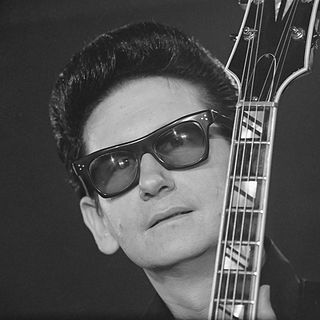
Roy Kelton Orbison was an American singer, songwriter, and guitarist known for his distinctive and powerful voice, complex song structures, and dark, emotional ballads. Orbison's music is mostly in the rock genre and his most successful periods were in the early 1960s and the late 1980s. His music was described by critics as operatic, earning him the nicknames "The Caruso of Rock" and "The Big O". Many of Orbison's songs conveyed vulnerability at a time when most male rock-and-roll performers projected machismo. He performed with minimal motion and in black clothes, matching his dyed black hair and dark sunglasses.
"Send In the Clowns" is a song written by Stephen Sondheim for the 1973 musical A Little Night Music, an adaptation of Ingmar Bergman's 1955 film Smiles of a Summer Night. It is a ballad from Act Two, in which the character Desirée reflects on the ironies and disappointments of her life. Among other things, she looks back on an affair years earlier with the lawyer Fredrik, who was deeply in love with her, but whose marriage proposals she had rejected. Meeting him after so long, she realizes she is in love with him and finally ready to marry him, but now it is he who rejects her: He is in an unconsummated marriage with a much younger woman. Desirée proposes marriage to rescue him from this situation, but he declines, citing his dedication to his bride. Reacting to his rejection, Desirée sings this song. The song is later reprised as a coda after Fredrik's young wife runs away with his son, and Fredrik is finally free to accept Desirée's offer.
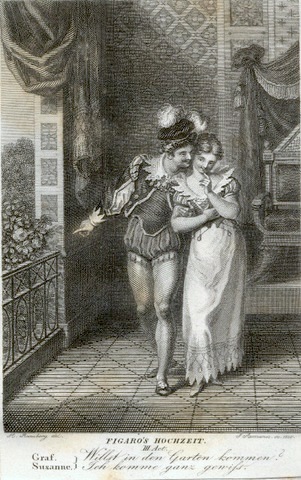
The Marriage of Figaro, K. 492, is a commedia per musica in four acts composed in 1786 by Wolfgang Amadeus Mozart, with an Italian libretto written by Lorenzo Da Ponte. It premiered at the Burgtheater in Vienna on 1 May 1786. The opera's libretto is based on the 1784 stage comedy by Pierre Beaumarchais, La folle journée, ou le Mariage de Figaro. It tells how the servants Figaro and Susanna succeed in getting married, foiling the efforts of their philandering employer Count Almaviva to seduce Susanna and teaching him a lesson in fidelity.

La sonnambula is an opera semiseria in two acts, with music in the bel canto tradition by Vincenzo Bellini set to an Italian libretto by Felice Romani, based on a scenario for a ballet-pantomime written by Eugène Scribe and choreographed by Jean-Pierre Aumer called La somnambule, ou L'arrivée d'un nouveau seigneur. The ballet had premiered in Paris in September 1827 at the height of a fashion for stage works incorporating somnambulism.

Tancredi is a melodramma eroico in two acts by composer Gioachino Rossini and librettist Gaetano Rossi, based on Voltaire's play Tancrède (1760). The opera made its first appearance at the Teatro La Fenice in Venice on 6 February 1813, less than a month after the premiere of his previous opera Il signor Bruschino. The overture, borrowed from La pietra del paragone, is a popular example of Rossini's characteristic style and is regularly performed in concert and recorded.

In the 11th century Matter of France, Ganelon is the knight who betrayed Charlemagne's army to the Saracens, leading to the 778 Battle of Roncevaux Pass. His name is said to derive from the Italian word inganno, meaning fraud or deception. He is based upon the historical Wenilo, the archbishop of Sens who betrayed King Charles the Bald in 858.

Domenica Rita Adriana Bertè, known professionally as Mia Martini, was an Italian singer, songwriter and musician. She is considered, by many experts, one of the most important and expressive female voices of Italian music, characterised by her interpretative intensity and her soulful performance.

Congratulations: 50 Years of the Eurovision Song Contest was a television programme organised by the European Broadcasting Union (EBU) to commemorate the Eurovision Song Contest's fiftieth anniversary and to determine the contest's most popular entrant of its fifty years. Hosted by Katrina Leskanich and Renārs Kaupers, the event took place at Forum, in Copenhagen on 22 October 2005. The host was Danish broadcaster DR. Fourteen songs from the contest's first half-century, chosen through an internet poll and by a jury, contested the event.
"Che gelida manina" is a tenor aria from the first act of Giacomo Puccini's opera, La bohème. The aria is sung by Rodolfo to Mimì when they first meet. In the aria he tells her of his life as a poet, and ends by asking her to tell him more about her life. It is one of the most recorded arias by tenors.
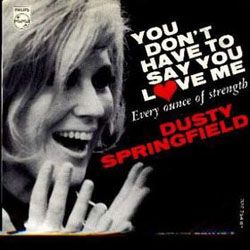
"You Don't Have to Say You Love Me" is a 1966 hit recorded by English singer Dusty Springfield that proved to be her most successful single, reaching number one on the UK Singles Chart and number four on the Billboard Hot 100. It is the cover of a 1965 Italian song by Pino Donaggio and Vito Pallavicini, titled "Io che non vivo (senza te)". Elvis Presley recorded another cover version in 1970 which was a hit in both the US and the UK. Other covers have charted in the UK, Ireland, Italy and Finland.

Patty Pravo is an Italian singer. She debuted in 1966 and remained most successful commercially for the rest of the 1960s and throughout the 1970s. Having suffered a decline in popularity in the following decade, she experienced a career revival in mid-late 1990s and reinstated her position on Italian music charts. Her most popular songs include "La bambola" (1968), "Pazza idea" (1973), "Pensiero stupendo" (1978), and "...E dimmi che non vuoi morire" (1997). She scored fourteen top 10 albums and twelve top 10 singles in her native Italy. Pravo participated at the Sanremo Music Festival ten times, most recently in 2019, and has won three critics' awards. She also performed twelve times at the Festivalbar.

Alberto Malesani is an Italian football manager and former player. As a manager, he is mostly remembered for his successful spell with Parma during the late 1990s, with whom they won the Coppa Italia, the UEFA Cup, and the Supercoppa Italiana.

Alan Sorrenti is an Italian singer and composer.
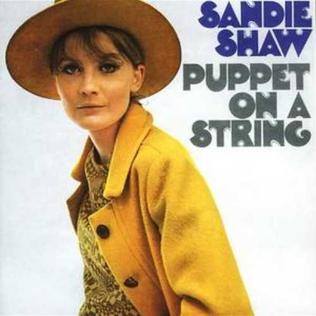
Puppet on a String is Sandie Shaw's third full-priced album, released on the Pye label in May 1967 on the back of her Eurovision success.
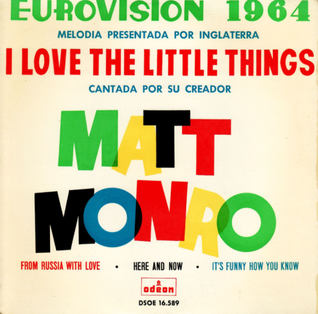
"I Love the Little Things" was the British entry in the Eurovision Song Contest 1964, performed in English by Matt Monro. The song was written by Tony Hatch.

"Le cose che non mi aspetto" is a song recorded by Italian singer Laura Pausini and produced by Paolo Carta, released in May 2012 as the fifth single from Pausini's 2011 studio album Inedito. The lyrics of the song were written by Laura Pausini and Niccolò Agliardi, while the music was composed by Niccolò Agliardi and Luca Chiaravalli.

Loren Allred is an American singer. Allred made her Billboard Hot 100 debut with the platinum-selling "Never Enough" from The Greatest Showman musical. She is featured on Michael Bublé's Love album in a duet of "Help Me Make It Through the Night", and alongside David Foster, as part of his An Intimate Evening PBS concert special and album. Her debut EP Late Bloomer was released on September 24, 2021.
"Saturday Night Live at Home" refers to the final three episodes of the 45th season of the late-night comedy program Saturday Night Live. Whereas SNL typically consists of sketches performed live in-studio, these "at Home" episodes were recorded remotely due to the impact of the COVID-19 pandemic on television; none of the sketches were performed live for any of these episodes, and none of the participants in any sketch from these shows were in the same physical location.

The Springsteen and E Street Band 2023 Tour is an ongoing concert tour by American singer Bruce Springsteen and his backing band the E Street Band. The tour began on February 1, 2023, in Tampa, Florida; it marks the first time since 2017 that Springsteen and the E Street Band have toured together. The tour is scheduled to conclude on November 22, 2024, in Vancouver.
















